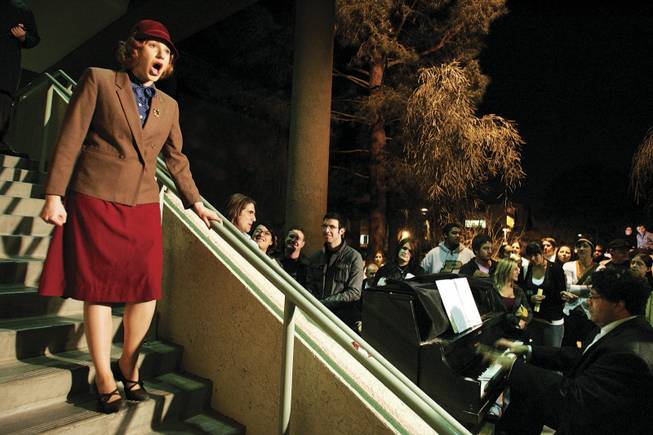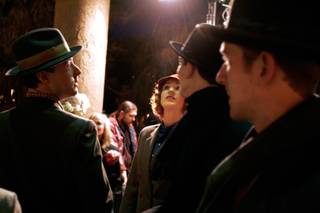
Jayme Puckett, costumed for her role in “The Cradle Will Rock” at UNLV’s Black Box Theatre, sings outside the venue before the show. The Nevada Conservatory Theatre musical begins outside, placing the audience in the framework of the show’s opening night in New York in 1937.
Wednesday, March 18, 2009 | 2 a.m.
IF YOU GO
What: “The Cradle Will Rock” musical by Marc Blitzstein
Who: Presented by Nevada Conservatory Theatre
When: 8 p.m. today through March 28; 2 p.m. matinees Saturday, Sunday and March 28 and 29
Where: Black Box Theatre, UNLV campus
Admission: $17-$20; nct.unlv.edu, 895-2787
Running time: 90 minutes, no intermission
Audience advisory: Show begins outside the theater, gentle audience participation
Sun Archives
Beyond the Sun
Something truly extraordinary is happening at UNLV’s Black Box Theatre.
Through the end of March, Nevada Conservatory Theatre is presenting a witty and rousing revival of the Depression-era “labor opera” “The Cradle Will Rock,” and it’s a must-see event, startling in its dramatic immediacy and timeliness.
On arrival at the theater, you are given a handout that places you within the real-life scenario of the show’s June 1937 opening night in New York. This was a big deal — the show was directed by then-21-year-old hotshot Orson Welles — and theatergoers found the theater locked and guarded by armed federal troops. The opening had been canceled by order of the Federal Theatre Project — an annex of the Works Project Administration, the stimulus plan of its day, which was started in 1935 to give jobs to unemployed people in their areas of skill. The WPA employed millions of out-of-work Americans and reconstructed the nation’s infrastructure — Hoover Dam and Boulder City are the most prominent local examples.
The Federal Theatre Project itself was under attack by right-wing congressmen, who claimed it was a communist propaganda.
While waiting on the street while Welles and producer John Houseman scrambled to find an unused performance space nearby, that 1937 opening-night crowd was entertained by cast members, then audience and performers marched 20 blocks uptown and the show went on. (There’s much more to this fascinating story, of course, and it’s well worth looking it up; it’s nicely explained in the show’s program book.)
Guest director Robert Benedetti seizes on this stranger-than-fiction intersection of showbiz and politics in an ingenious prologue to the play. The audience gathers outside the Black Box Theatre, and after explaining the situation, the in-character cast leads the waiting crowd in a rousing round of pro-labor songs such as “We Shall Not Be Moved” and “The Boss Is Having a Terrible Time, Parlez Vous.” It’s a jolly and entertaining gambit, and we can chuckle about it now, but this was serious stuff, and the songs, by Woody Guthrie and others, have lost none of their potency.
“Welles” and his actors lead a spirited procession into the Black Box Theatre, which has been converted by scene designer Donald C. Rose III into a rough-hewn, wood-planked makeshift space, with touches of WPA-period art deco design.
The show is staged in the round, with the actors sitting amid the audience, getting up to do their bit and returning to their seats. It’s risky for actors working this close, but it pays off in intimacy and connection, and under the direction of Benedetti and choreographer Anthony Coppola, the young cast is more than up to the challenge.
A cautionary fable with music, “Cradle” is about an industrial Anytown under the iron fist of steel magnate Mr. Mister and his wife, Mrs. Mister, every bit his equal as a bully. Between them, they buy control over the cops, the clergy, the press, the merchants and the artists. The assembled sellouts are tried in a late-night kangaroo court at a jail, while somewhere, newly unionized steelworkers are organizing.
Benedetti is blessed with a versatile and energetic ensemble, which deftly maneuvers the tricky Brecht-Weill-influenced sprechgesang. Several actors deserve particular notice, especially Christina Wells, who plays FTP actress Peggy Coudray, an imprisoned floozy and the monstrous Mrs. Mister. Wells can belt and coo with equal verve, and possesses a natural and vivid stage presence. Savannah Smith-Thomas soaringly sings the part of Olive Stanton, and Kenn McLeod, who doubles as Welles, exudes unctuous menace as Mr. Mister.
Christian Matzias plays author/composer/lyricist Marc
Blitzstein and accompanies the action, navigating Blitzstein’s jagged, jittery, jazzy rhythms and creates stage effects — a ringing telephone, an explosion — on the piano.
The technical side of the production is impressive, too, particularly Ashleigh Poteat’s snappy and period-evocative costumes and lighting designer Jamie Lofthouse’s deft deployment of follow spots.
“Cradle” is a smart, thoughtful choice for Nevada Conservatory Theatre and for this town — while watching, you can’t help but think of the CityCenter construction deaths and assorted recent scandals. From its ingenious opening gambit to its galvanizing ending this is a shining exemplar of what only live theater can do.


Join the Discussion:
Check this out for a full explanation of our conversion to the LiveFyre commenting system and instructions on how to sign up for an account.
Full comments policy